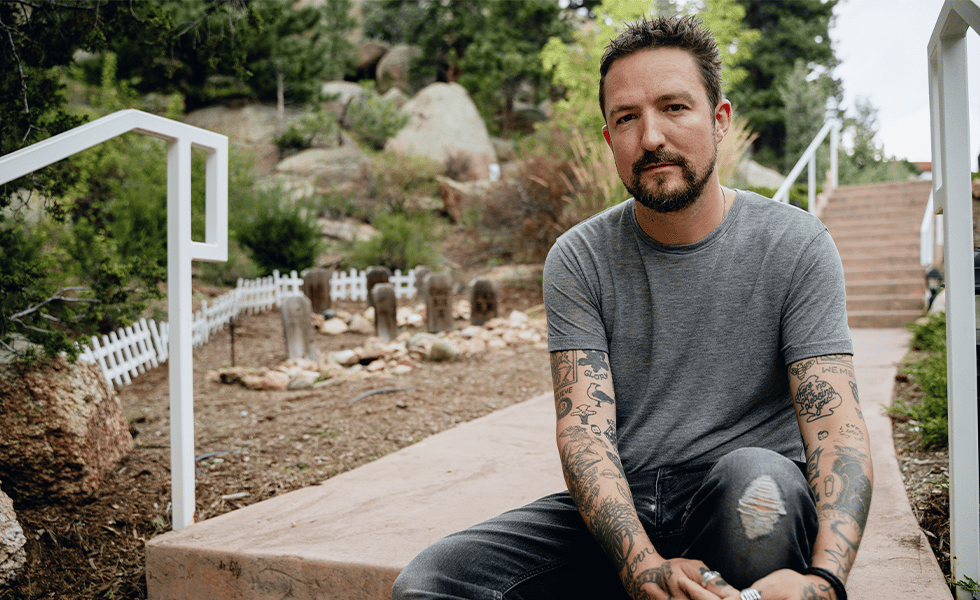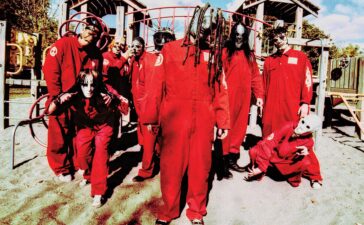Opening Up sees us talk to musicians about the opening track from each of their studio albums. Our next guest is Frank Turner, the veteran English folk-punk singer-songwriter that has just released his tenth solo album Undefeated. From house shows to the Olympic Games, this troubadour has lived a thousand lives both on the road and in the studio – and he’s not done yet.
When Blunt connects with Frank Turner on Zoom, it feels as though his breakfast has been interrupted. He’s sat at his kitchen table, pyjamas on beneath a fluffy bathrobe, and sipping on what he informs us is his second coffee of the morning. He’s in good spirits, however: He’s overlooking the sea from his Essex window, grinning as he recalls an anecdote of England’s infamously rocky beaches.
“I remember my old band, Million Dead, went to the beach in Portsmouth while we were on tour,” he says. “Our bassist Julia [Ruzicka], who’s originally from Australia, took one look at it and was like, ‘…god, is this it? This is not a beach!’ The rest of us didn’t know any better – but as I know now, you more or less just have to travel to literally anywhere else in the world, see a beach there and immediately go ‘oh, this is better’.”
Not long after Million Dead came to an end in the mid-2000s, Turner decided to continue on making music under his own name. Setting out with little more than an acoustic guitar and some stories of his life, he simply could not have predicted the arena-filling, chart-topping, award-winning career that was to come. And yet here we are, nearly 20 years later, with Turner staring down the barrel of album number ten. “It’s a large number – too large, really,” Turner wisecracks. “It’s surreal to get to this point in your career, but it’s also a testament to the longevity of this whole damn thing.”
As we prepare to deep dive on all ten of his album openers, Turner is queried as whether he believes there’s something that unifies them – in spite of their varied sonic approaches. “I will say that I’m the kind of person who thinks an awful lot about what the first thing you’re going to hear is when you press play on my album,” he says. “It’s extremely important to me. Of the ten songs we’re talking about, let’s just say that none of them are casual accidents.”
HYPERLINK “https://www.youtube.com/watch?v=mkFPwDYZYHo”https://www.youtube.com/watch?v=mkFPwDYZYHo
‘The Real Damage’ – Sleep is For the Week (2007)
Frank Turner’s first solo album begins with exactly that: Frank Turner, solo. It’s how he cut his teeth in those early post-Million Dead days, and every night he’d be playing either the corner of a pub or some house show you’d find ‘The Real Damage’ on the setlist. It was the second song Turner had ever written on his own, and in those days had become his set closer. “There’s different prerogatives to writing a setlist and writing an album,” says Turner when discussing why his closer had become his opener.
“They tend to serve different functions, and in this case I felt like I was leading the album with my best foot forward. At the time, that’s the song I was best known for. I was starting to play more with a band at this point, as evidenced by the rest of the album, but because I’d done so much solo touring early on I thought it would be cool to lead the album that way. It’s a good story song, too – people seemed to be drawn to that in my early days.”
The story details a hungover Turner waking up in unfamiliar surrounds after a big Saturday night, doing his best to get back home – and realising that “the best years of my life” (ie. his 20s) maybe aren’t all they’re cracked up to be. It ends with the lyric “It was about then that I realised/I was halfway through/The first day of the week.” To clarify: No, he doesn’t think the week starts on a Sunday. “That’s the point!” he laughs. “The punchline of sorts is that I assumed it was Sunday, because I’d gone out on Saturday, but it was actually Monday and I’d somehow completely missed an entire day. I was on a bus home and noticed a lot of people on their way to work, and that’s when it twigged. This was before smartphones, I should add. I don’t want to sound too much like I’m endorsing that level of bacchanalian insanity, but I definitely went hard in those days!”
HYPERLINK “https://www.youtube.com/watch?v=NcQ2XmNvjk4″https://www.youtube.com/watch?v=NcQ2XmNvjk4
‘I Knew Prufrock Before He Got Famous’ – Love Ire & Song (2008)
It doesn’t get much more of a blatant album opener than the very first line being “Let’s begin at the beginning.” ‘Prufrock’ is a reflection on Turner’s circle of friends, painting them as underdogs that are fiercely loyal to the pack. The kind of friends that can get through anything, so long as they’re a united front. It’s uniquely specific to Turner insofar as he directly namechecks these friends: There’s Aaron, the “resurrected spirit of Gram Parsons”, and there’s Jay who “sings songs and slays dragons”, to name just a couple. In spite of this, Turner has noted how many people have told him how much they relate to and connect to the song on a personal level.
“It’s the ultimate magic trick in songwriting that I think most of us are chasing,” says Turner of the phenomenon. “If there was a shortcut version of doing that, I’d live in a bigger house! You have to more or less stumble across it. The sound of somebody trying to write a song that’s both universal and specific is the sound of like…” Turner pauses. “I’m gonna be rude about someone,” he grins. Let’s pick Robbie Williams, ‘Angels’. When somebody’s very consciously trying to do that, like on that song, it sounds very processed to my ear.”
‘Prufrock’ still makes the setlist rounds to this day, leading Turner to recall a show somewhere from the American midwest on a recent tour. “I was having a bad day and was a bit fucking over it,” he says. “There was this 60-year-old guy in the audience, on his own, who demographically didn’t quite look like the kind of person who’d normally come to my shows. When we played that song, he closed his eyes and screamed every single word. It was a really emotional moment. This is a song about a bunch of 23-year-olds taking too many drugs and living in a bar in London. This guy, who lives 5000 miles away, had such a visceral reaction to it. It really put me back in my box; I thought to myself, ‘This really is a worthwhile thing’. If you get one person like that at a show, it makes the show worth doing.”
HYPERLINK “https://www.youtube.com/watch?v=nkf9I2wCc3E”https://www.youtube.com/watch?v=nkf9I2wCc3E
‘Live Fast Die Old’ – Poetry of the Deed (2009)
“We need to talk about this.” Turner has preempted what’s to come as we move onto album three – going from one of his most acclaimed albums to one of his more forgotten ones. Though home to set staples ‘The Road’ and ‘Try This At Home’, not a lot else has survived from this era 15 years on – least of all its humble opener, reflecting on punk rock’s ethos but rejecting its kamikaze nihilism. “It’s a direct response to my earlier defeatism,” he says. “It came out of a conversation with my friend Jay, who makes music as Beans On Toast, about the song ‘The Ballad of Me & My Friends’ from the first record. It’s a song where I’m like, ‘None of this is gonna last, but who fucking cares?’ We were at a point in our lives, a few years in, where we were now planning to do this for a long time. This song came out of it: Rejecting the doom-and-gloom and reconsidering it.”
So, why has the song long been abandoned? “There’s effectively a kink in the spine of it,” Turner replies. “We had all these different sections, and we tried them in 8000 different combinations – this is the chorus, this is the verse, this is the bridge. We did it so many times that we kind of lost sight of what we were doing. Eventually we came up with a not-terrible arrangement of the sections, and that’s what you hear on the album. Frustratingly, we were rehearsing the song again for the tenth anniversary of that album in 2018 and I suddenly went, ‘I’ve got it!’ I figured out how to arrange the song… ten years too late.”
Though he knows Poetry as a whole is not without its fans, Turner is (ahem) frank about the album. “I rushed that record,” he says. “Everyone was telling me that the next album after Love Ire & Song was really important, and I was like, ‘Cool! Let’s make it in nine days!’ Me now would have told 27-year-old me to take a minute journallng and spending a little longer on the arrangement and recording. It would have been a much better record.”
HYPERLINK “https://www.youtube.com/watch?v=Pj2RluVpB2U”https://www.youtube.com/watch?v=Pj2RluVpB2U
‘Eulogy’ – England Keep My Bones (2011)
The trumpeting fanfare that begins England Keep My Bones began in an unexpected environment: A jetlagged Turner, humming to himself in the shower before a festival in Minneapolis. He soon had eight lines set to that hummed melody, under the impression that it would form part of a longer song. When he came back to this jotted-down idea, however, the realisation hit him: Maybe this was all he needed.
“It felt almost hymnal,” says Turner of writing ‘Eulogy’. “That quality felt present in a lot of the songs I was writing for what became the album, which is where the idea for the album cover to look like a hymn book came from. I’m self-evidently not a religious person, given [album closer] ‘Glory Hallelujah’, but I grew up going to a lot of dusty churches in English villages. I wanted ‘Eulogy’, and all these songs, to have a found quality to them – that all these songs were community-worn.”
‘Eulogy’ achieves this through its opening horns, which were inspired by military and mining brass bands and whose arrangement was written by Turner in collaboration with Matt Nasir – the keyboardist of Turner’s long-serving backing band The Sleeping Souls. They were played by members of the Retrospective Soundtrack Players, an English band that were labelmates with Turner on Xtra Mile Recordings.
“I didn’t know a lot of people who played horns at the time,” says Turner. “I wanted sort of a colliery band feel, and they were a country band from Portsmouth. They really captured the vibrance of what I was going for.” Turner’s sole gripe with the song? “You can’t just play it anywhere you like in a show,” he laughs. “It has to be either the first song of the night or the first song of the encore. That’s it. It has to be followed by [second track] ‘Peggy Sang the Blues’, too. You can’t just play this 90-second song and then go, ‘thank you!’” HYPERLINK “https://www.youtube.com/watch?v=F1L5zJ2afLs”https://www.youtube.com/watch?v=F1L5zJ2afLs
‘Recovery’ – Tape Deck Heart (2013)
By every metric, ‘Recovery’ is Frank Turner’s biggest song. It’s his most-streamed song, with over 37 million plays on Spotify alone, and his only song to hit number one on a chart – outside of the UK no less, on the Billboard Adult Alternative chart. Despite having premonitions about songs being successful in the past, however, Turner admits that this wasn’t necessarily how he felt upon originally completing writing the song. “I wasn’t sure that this was the right first song for this record,” he says. “It took some long conversations with label people and all the rest of it to really convince me.
“They were all on it right away: ‘First single! Best foot forward! Slam it at the front of the record! It’s really going to help things sort of take off!’ I was just like, [shrugs shoulders] ‘OK’. When it took off like it did, I couldn’t believe it. It was number one on American radio for awhile. When we played it for the first time in the US – sort of halfway through the set, trying to sandwich in an obligatory new song in-between old ones – the fucking building nearly fell down. Everyone went insane! I remember looking at the rest of the guys in the band, going ‘…I think we’re gonna put that somewhere else on the set tomorrow’.”
Turner describes ‘Recovery’ somewhat diplomatically as “less philosophical” as an opener than the others discussed thus far. “It served its purpose, and it worked obviously, but it was less about being the first thing you heard as part of the overarching album and more ‘hey, here’s the fuckin’ single,’” Turner laughs. He also doesn’t necessarily think it’s up there as his best work: “My personal top 10 will always be extremely different to the one on Spotify,” he says. “The last track on Tape Deck Heart, ‘Broken Piano’, is one of my favourite songs I’ve ever written – and no-one seems to agree with me.” Still, he is thankful for what ‘Recovery’ has given him over the ensuing decade and change. “I can’t argue with it being my biggest-selling record,” he concedes. “Happy days!”
HYPERLINK “https://www.youtube.com/watch?v=v88EAdooOFc”https://www.youtube.com/watch?v=v88EAdooOFc
‘The Angel Islington’ – Positive Songs for Negative People (2015)
For the geographically minded of you, The Angel Islington can be found in northeast London, close to where Turner grew up. It’s a hub of sorts, as he describes – home to a tube station and a statue that both share the name. “It’s the midway point between all these places I’d hang out growing up – Holloway Road, Camden Town, Dalston,” Turner says. “It’s really a lovely area to set a song, I think.” As with many of Turner’s song,s however, there’s more to this story than meets the eye.
“There was a woman that I was sort of falling in love with at the time,” he explains. “We happened to live an equal distance from The Angel Islington, so if we left at the same time on foot we’d arrive there simultaneously. When I was writing that song, I thought ‘Well, there’s no way she could resist me if I wrote her a song’. Turns out there was a way: It turned out that she was gay. I felt like an idiot, but we’re still good friends.”
Turner notes that Positive Songs is his only album to date to feature a finger-picked guitar intro. Normally waiting until around a third of the way through a record normally, he decided to see how it would fare at the very beginning. “The thing about finger-picked songs is that they just sort of hover there,” he says. “It has the energy of a quiet moment before you ramp up towards the big finish at the end of an album. With this one, I just thought, ‘Fuck it’. I really love it for that. I don’t play it live all that often, but whenever I do people tend to lose their shit. It’s nice that people still remember it.”
HYPERLINK “https://www.youtube.com/watch?v=px_vFaZanmE”https://www.youtube.com/watch?v=px_vFaZanmE
‘Don’t Worry’ – Be More Kind (2018)
The end of the 2010s saw Turner enter his wilderness years of sorts – making albums that, while commercially successful, were met divisively by his fanbase. The first of these was the more pop-oriented Be More Kind, which opens with the earnest ‘Don’t Worry’. In writing the song, Turner says he was particularly inspired by the late, great Bill Withers – someone who could write songs with the universality discussed earlier. “I had become obsessed with the craft of a song like ‘Lean On Me’,” he begins.
“It’s just so brilliantly bizarre when you look at it. It’s the first five notes of a major scale up and down, with about three chords thrown in, and it’s one of the greatest songs ever written. I was aiming for a similar kind of simplicity and repetition with this song. It’s very deliberate in that sense – I had never really tried to go straight down the line like that before. The methodology had changed, but the message was the same – and I liked that. It’s not the greatest song I’ve ever written, but I still think it’s cool.”
Turner is well aware that many folks that became fans in his early years open baulked at Be More Kind upon its release, chiding him for said simplicity and the choices made in the musical arrangements. Even with that in mind, Turner is ultimately glad he went through with it: “It felt like a record that I had to make, in a way,” he says.
“There are production and arrangement decisions on that album that I would not make now, and there are also good songs on there that are damaged by the way we recorded them. Both of those things are 100% my fault – I was obsessed with loops and synthesizers at the time, and I felt like I needed to push myself out of my usual boundaries. ‘Don’t Worry’ is a good example, actually: There’s this processed stomp-clap going through it, and some weird mandolin loop as well. There’s no part of me that wants to disown this album, but if I were making it again it would be much more organic – it would simply be the sound of a band playing.”
HYPERLINK “https://www.youtube.com/watch?v=ekWbbUe2lMQ”https://www.youtube.com/watch?v=ekWbbUe2lMQ
‘Jinny Bingham’s Ghost’ – No Man’s Land (2019)
“Fuck everybody!” A smirking Turner is already on the front foot knowing where conversation is headed next. No Man’s Land is easily Turner’s most controversial album to date – a concept album of sorts where each song is written about a woman that was a historical figure of some kind (save for closer ‘Rosemary Jane’ about his mother). It didn’t take long for Turner to be accused of mansplaining, and to be accused of hypocrisy given the tour supporting the album was with all-male opening acts.
“I’m not going to say that all the rhetoric around the album’s presentation was as carefully put together as it could have been,” Turner begins. “That said, there was a lot of bad faith around the criticism of it. The album got monstered; it was an easy target at a time one was needed. That always annoyed me, because I think there’s some incredibly complex and interesting songwriting on this record. The whole point was to see if I could write an entire album that wasn’t about me and my own bullshit.”
‘Jinny Bingham’s Ghost’ is described by Turner as “the only song on the album anyone seemed to like”. It tells tale of the eponymous publican who was accused of being a witch in Camden Town circa the 1600s. “Because she ran a bar, it plays like a drinking song,” says Turner. “The story goes that the bar was kind of a refuge for outcasts and outlaws. There’s actually still a bar on that very site, which funnily enough is a metal bar and punk-rock venue. The song has a real 19th-century balladeer kind of vibe to it, which I quite like.”
HYPERLINK “https://www.youtube.com/watch?v=FutOmkhF9DY”https://www.youtube.com/watch?v=FutOmkhF9DY
‘Non Serviam’ – FTHC (2020)
From the haunted streets of Camden Town to the sweaty rush of a circle pit, ‘Non Serviam’ is the most urgent of all ten album openers. It’s a blood-rush of punk rock, a served notice that rumours of Frank Turner’s demise had been greatly exaggerated. This fury-driven throwback to Turner’s days in hardcore, ironically, lead him to feel somewhat shy about it at first.
“I had the riff, and I figured it might have been a song for my side project Mïngle Härde,” he says. “It couldn’t be a Frank Turner song… could it? After awhile, I started to question why it couldn’t be a Frank Turner song. I mean, I’m Frank Turner. I wrote it. That’s the name on my passport, and it’s the name on the album. Why not? There’s a sense of reclamation there – this is the kind of music that I fucking loved when I was 16, and I still love it to this day. Starting the record this way was a big statement: It was all guns blazing, letting you know right away that things are going to be different this time around.”
With plenty of pent-up anger – not only at the reception to No Man’s Land, but the world around him as the pandemic raged on – Turner channelled every last bit of rage and disgust into ‘Non Serviam’. He knows the song sounds like a massive fuck-you – “That’s the idea,” he says. “I was quite pissed off about a lot of things, and I was targeting people who think you should sacrifice artistic principles to the intellectual fad of the day. I’ve never done that, and I’m not going to start now just because there’s more idiots shouting about it. It’s not an ‘I’m back’ song, because that’s not quite what I mean, but it’s got a little bit of that going on.”
Turner also notes a run of festivals in 2019 – one of his last pre-COVID – was a key inspiration to the song from a musical standpoint. “They were very punk-rock oriented festivals,” Turner recalls. “I’d be standing there backstage, hanging out with [NOFX frontman] Fat Mike and friends I’d made in bands over the years, and I really felt a sense of belonging that I hadn’t felt in awhile. Being around music like that felt like home.”
HYPERLINK “https://www.youtube.com/watch?v=zI-o1S9FJl8″https://www.youtube.com/watch?v=zI-o1S9FJl8
‘Do One’ – Undefeated (2024)
In March 2023, Frank Turner found himself in New Zealand – Wellington, to be specific – opening for his childhood heroes the Counting Crows. He’d just had the word “undefeated” tattooed on his back, which can be seen on the cover of the album in question, and was on his own in a hotel room with his guitar. The urge to write formulated, and the rest is history. “Some songs take five years to write,” says Turner. “’Do One’ took two hours.”
“The album was seemingly done – I had the title, obviously, and all the songs were written. I’d begun looking at what the rhetoric of the album was – what’s it about? What am I trying to say? As I was doing that, I realised there was another song that needed to exist to make the point of the album a bit more forcefully. So there I was, alone in my room, with my tour manager Doug in the room next door. I recorded a demo on my phone, which took me a few gos to get. As soon as I finished the take where I got it, a text came up on my phone. It was from Doug, and it just read: ‘That’s a good song’.”
So, what is Turner trying to say on ‘Do One’ – and, by extension, Undefeated as a whole? Simple: After 10 albums, he’s still not going away. “I’ve written a lot of songs about how it’s going to be OK and staying positive,” he says. “This was the other side of that coin, where it’s a bit more defiant. I’m going to be OK, I’m staying positive, I’m still here. The world threw a whole lot of bullshit at me, and it didn’t matter. I kept going.”
Undefeated is out now via Xtra Mile Recordings.










